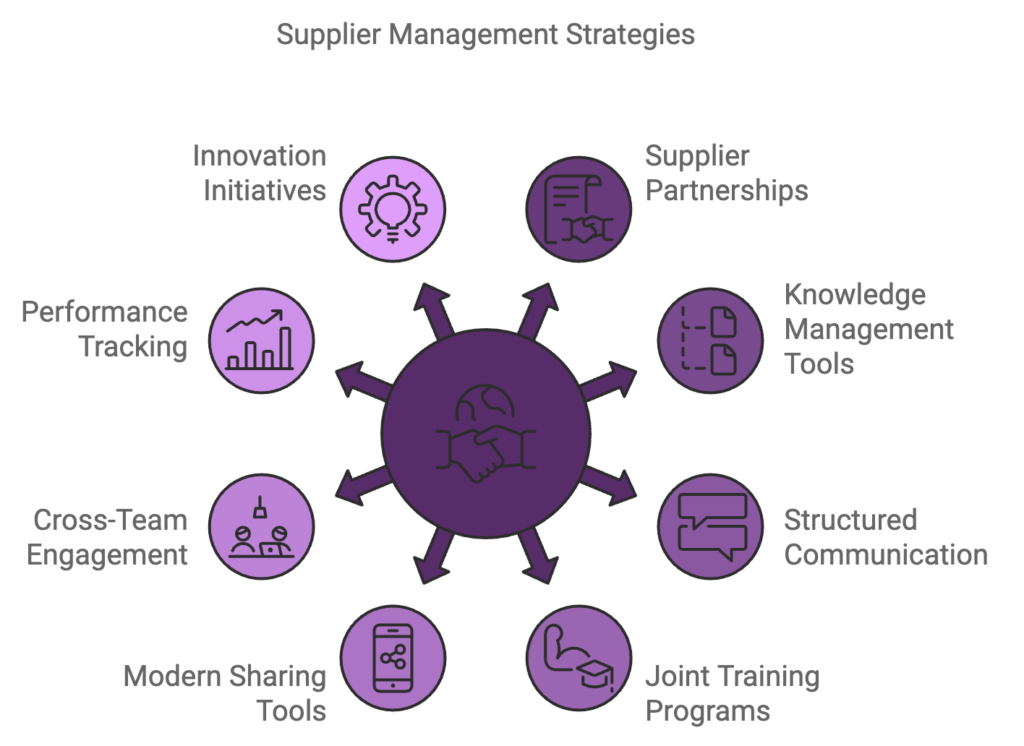Better supplier management makes businesses successful. Sharing knowledge strengthens supplier relationships and boosts collective performance. Here are ten proven methods to strengthen supplier management through knowledge sharing.
Performance Highlights
| Strategy | Benefit |
|---|---|
| Consider suppliers as partners | Promotes long-term growth and collaboration |
| Set up knowledge management tools | Organizes information effectively |
| Create structured communication | Promotes transparency and teamwork |
| Develop joint training programs | Aligns practices and demonstrates commitment |
| Use modern tools for sharing | Makes data exchange straightforward |

1. Consider Suppliers as Partners
Building partnerships rather than transactional relationships sets the foundation for effective supplier development. This mindset creates natural opportunities for exchanging ideas and expertise.
Strong supplier relationship management focuses on building lasting partnerships that benefit everyone involved. When you work with suppliers as true partners, you can exchange industry insights, proven methods, and market updates, leading to better outcomes and enhanced operations.
2. Set Up Knowledge Management Tools
An organized, user-friendly system for information sharing with suppliers serves as a foundation for success. The system should work smoothly for both internal teams and external partners.
A central information hub helps maintain consistent, current data access. This reduces errors and strengthens collaboration. Modern e-sourcing tools support this goal. These tools store vital documents, proven methods, and historical records, giving suppliers quick access to needed information.
3. Create Structured Communication
Direct, honest communication drives knowledge sharing success. Schedule consistent virtual and in-person meetings to discuss challenges, share wins, and establish shared objectives.
Well-planned communication builds trust and collaboration, resulting in enhanced supplier performance and stronger working relationships. Plan regular status updates, quarterly assessments, and yearly strategic sessions to thoroughly examine various aspects of supplier partnerships.
4. Develop Joint Training Programs
Creating shared training initiatives with suppliers effectively aligns methods and establishes common standards. These programs can address quality control protocols and environmental practices.
Supporting supplier training shows commitment and builds capabilities. This often results in marked improvements in supplier output. Offer workshops, online modules, or on-site instruction to enable practical learning and collaborative problem-solving.
5. Use Modern Tools for Sharing
Current technology streamlines knowledge exchange between buyers and suppliers. Digital procurement systems and supplier management applications simplify communication and data sharing.
Technology reduces routine work, creating space for meaningful discussions and knowledge transfer. This speeds up problem resolution and sparks fresh thinking. Implement shared metrics dashboards, live data tracking, and collaborative work tools to enhance information flow.
6. Promote Cross-Team Engagement
Knowledge sharing should extend beyond procurement teams. Connect various departments like R&D, quality assurance, and logistics in supplier management efforts.
This comprehensive approach yields richer insights and ideas, boosting supplier results. Organize collaborative sessions where suppliers meet different organizational teams, sparking advances in product design, supply chain efficiency, and business processes.
7. Track Supplier Performance
Setting clear metrics and discussing results with suppliers drives ongoing advancement. These measurements should reflect fairness and match business goals.
Regular performance discussions create chances to share insights and tackle challenges together. This measured approach spots areas needing work and guides supplier growth. Create balanced evaluations covering quantity, quality, timing, innovation, and sustainability.
8. Launch a Supplier Innovation Initiative
Foster supplier creativity by establishing a structured innovation program. This can spark significant advances in products, methods, or services.
Creating channels for suppliers to present innovations taps into valuable expertise. This strengthens supplier development while creating business advantages. Build clear processes for idea submission and evaluation, and recognize suppliers who contribute valuable innovations.
9. Build a Progress-Focused Culture
Creating an organization that values knowledge sharing and steady progress drives lasting supplier management success. Push both internal teams and suppliers to refine processes and outcomes.
This mindset leads to greater efficiency, lower expenses, and superior quality throughout supply operations while strengthening organizational partnerships. Apply proven progress methods like Lean practices, working closely with suppliers. Share success stories to maintain engagement.
10. Track and Report Knowledge Sharing Results
Sustaining knowledge sharing requires measuring and communicating its impact. Monitor performance indicators showing how knowledge exchange affects supplier output and business results.
Share notable achievements and concrete results with teams and suppliers regularly. This reinforces the value of knowledge sharing and maintains participation. Create reports showing tangible benefits like cost reductions, quality gains, or faster product releases. Apply these findings to refine knowledge sharing methods.
Moving Forward
Strong supplier management through knowledge sharing builds resilient, high-performing supply chains. These ten methods help organizations build stronger supplier relationships, generate fresh ideas, and achieve sustainable growth.
Remember that successful supplier management requires ongoing attention and effort. Stay adaptable and welcome feedback as you implement these strategies. Supply management practices evolve, and your approach should too. Monitor your knowledge sharing effectiveness and adjust strategies to meet changing business needs.
Focusing on knowledge sharing in supplier management creates a collaborative setting that drives mutual success. This approach not only makes operations more productive but also makes your organization a valued supply chain partner, helping you work with top suppliers.
Visit our products page to discover tools that can help strengthen your supplier management practices. Our systems support effective implementation of these knowledge sharing strategies, leading to measurable gains in supplier relationships and supply chain results.



